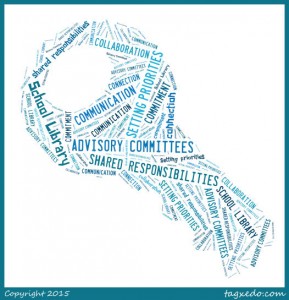 What are the keys to an effective school library advisory committee? I propose these: Communication-Connection-Commitment-Collaboration.
What are the keys to an effective school library advisory committee? I propose these: Communication-Connection-Commitment-Collaboration.
Communication:
If classroom teachers have not had positive input into school library collection decision-making, then they may refer to the library collection as the property of the librarian. When a classroom teacher tells students to be careful with “Ms. Jones’s books” (the librarian’s books), the wise school librarian will make it clear that the library collection belongs to all of the library stakeholders: students, teachers, administrators, and families.
Once collective ownership is established, the librarian can invite classroom teacher colleagues to join the school library advisory committee in order to participate in decision-making regarding library purchases and initiatives, such as grant writing and literacy events.
Connection:
The wise school librarian will ensure that the resources of the library are aligned with the curricular needs of classroom teachers and students. While the Common Core State Standards may make this a library goal in many states, the school library has always been charged with providing resources and technology tools to support teaching and learning the required curriculum.
Commitment:
In most schools, the school library advisory committee will meet during before or after school hours. It will be important for the school librarian to honor the extra commitment it will take for classroom teachers to participate in developing the library collection as a shared resource for the school community. Likewise, the school librarian’s commitment to shared decision-making must be genuine and clear to all advisory committee members.
Collaboration:
One of the most outstanding benefits of a library advisory committee is increased collaborative teaching between classroom teachers and school librarians. When advisory committee members have shared responsibility for selecting resources, they will have a shared commitment to using those resources for standards-based instruction. While classroom-library collaboration ensures that valuable resources will be integrated into instruction, it can also improve educators’ teaching and students’ learning.
School library advisory committees that achieve the four keys, communication-connection-commitment-collaboration = win-win-win-win for all library stakeholders.
Word cloud created at Tagxedo.com
